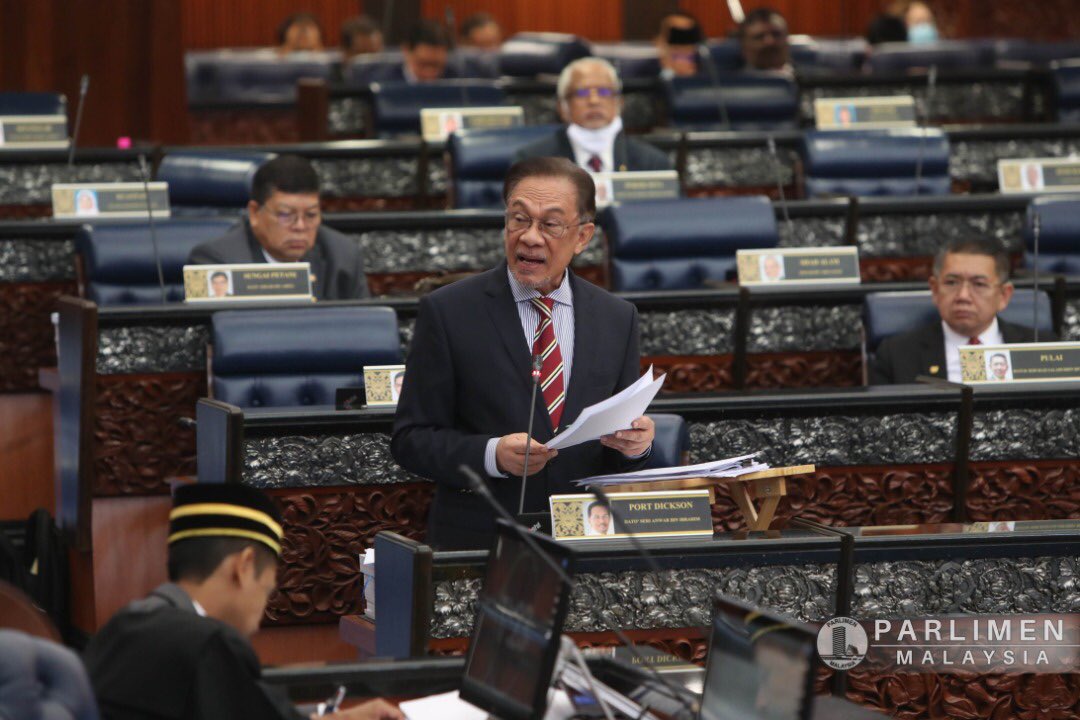KUALA LUMPUR, July 15 — Opposition Leader Anwar Ibrahim questioned today if Malaysia’s low Covid-19 numbers are accurate, pointing out that Malaysia’s testing rates are much lower than other countries.
He also highlighted reports of false negative results from antigen rapid test kits (RTKs) deployed at the Kuala Lumpur International Airport, where Malaysians from abroad tested negative for the coronavirus upon arriving in Malaysia but later tested positive with the gold-standard PCR test in Sarawak.
“I want to stress a matter that we shouldn’t take lightly — are these numbers real?” Anwar said in his debate on the royal address in Parliament, referring to Malaysia’s daily Covid-19 cases that have recently been reported in the single-digits.
“If you compare to countries with a similar population size — Australia, Malaysia, Canada — our testing capacity is too low.”
The Port Dickson MP from PKR pointed out at the Dewan Rakyat that Malaysia runs 0.18 tests per 1,000 population, compared to Australia’s 1.98 and Canada’s 1.03.
“We want to know the total infections, which is connected to the total tests done. We test 10,000 people in a cluster, we’ll get 1,000 [cases]. If we test 100, we may get one. So, in order to safeguard public safety, testing capacity must increase.”
He noted that with Canada’s 1.03 tests per 1,000 population, the country detected 243 new Covid-19 cases and 8,783 total deaths. Australia’s 1.98 tests per 1,000 population yielded 183 new coronavirus cases and 108 total deaths. Malaysia’s 0.18 tests per 1,000 population resulted in seven new cases and 122 total deaths.
“The second issue is the method of testing,” Anwar said, citing the Sarawak Disaster Management Committee’s (SDMC) statements on false negative results from the antigen RTK at KLIA.

Bandar Kuching MP Dr Kelvin Yii similarly raised concern about reported inaccuracy with the antigen RTK used at the borders and entry points of the country.
“This raises the question of whether the government should be transparent with information. How many cases of false negatives have entered our country and returned to their respective homes?
“Even though we have a home quarantine policy, the false negative results from the antigen RTK may give a false sense of security. Because of that, they may infect their family members who then go out to public areas. Perhaps the government can reveal how they handle this issue — how can they isolate these cases to avoid a second wave or other infections?” the DAP lawmaker told Parliament.
As of last Monday, authorities have reported seven false negative results from the antigen RTK used at airports. The latest case — who had returned from Russia — tested negative for Covid-19 at the airport and subsequently infected his or her father picking him or her up upon arrival. The person tested positive for the coronavirus on a repeat test after experiencing fever and respiratory symptoms.

Former Deputy Health Minister Dr Lee Boon Chye warned the government that as the Covid-19 pandemic was still raging in other countries, Malaysia faced a possibility of new clusters.
“Testing accuracy for Covid-19 is the foundation for our success in handling a possible subsequent outbreak,” the Gopeng MP (PKR) told Parliament.
“We must have tests that are accurate and sufficient, so that we can control any future outbreak.”
Subang MP R. Sivarasa (PKR), like Anwar, praised the performance of the Ministry of Health (MOH) and Health director-general Dr Noor Hisham Abdullah in handling the Covid-19 outbreak, but also expressed worry about Malaysia’s low testing numbers compared to other countries like Australia and Canada.
“Secondly, on the issue of transparency, compared to the transparency [of information] on new cases, cases in hospital, we don’t see much data on testing — where tests were done, how many tests per week or every few days. This must be revealed,” Sivarasa told Dewan Rakyat.
“I also agree that the number of tests is important to know the actual incidence of Covid-19 in the country.”
R. Sivarasa, Subang MP
“We spent a few billion to rejuvenate the economy, but the government must spend more money on this matter to ensure effective testing, like what Gopeng mentioned. It must be more widespread and testing data must be reported to the people.”
Anwar and Dr Lee also highlighted the impact of Covid-19 on people with other diseases, such as delayed treatment for cancer patients up to six months, according to the National Cancer Society of Malaysia.
Dr Lee pointed out that the United Kingdom suffered an increase in the mortality rate by 25 per cent during the coronavirus outbreak, involving people dying from diseases other than Covid-19. In Indonesia, each person who died from Covid-19 saw eight extra deaths from other illnesses like cancer or heart disease because of constraints in the health care system.
“When we look at the impact of Covid-19, it’s not just the direct impact from the pandemic, but the indirect impact from limitations on health care systems.”








